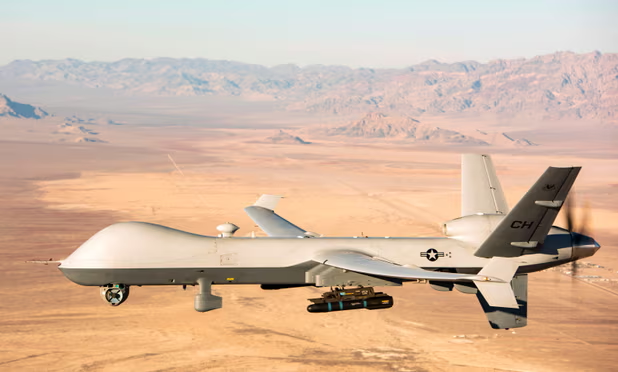On January 4th, the “Wall Street Journal” reported that the United States is actively increasing its military presence in West Africa. This strategic move involves the establishment of drone bases along the West African coast, coinciding with a period of significant political changes in the African Sahel region and West Africa. The region has recently seen a resurgence in military coups, exemplified by the latest coup in Niger on July 26th. Several other nations in the area still face the looming threat of similar events.
Meanwhile, global powers such as Russia and China are closely monitoring and capitalizing on these political transformations to bolster their influence across political, military, and economic spheres. The escalating military activity in West Africa underscores the geopolitical complexities unfolding in the region.
Multiple Reasons
The adoption of this approach by Washington can be elucidated by various motives, with the most prominent ones being:
1. Enhancing military presence in the region: This is situated within the context of the ongoing competition between the United States and China regarding the establishment of military bases in the region. Specifically, the American strategy is concentrated on the West African coast, encompassing countries bordering the Atlantic Ocean. Consequently, American interest is intertwined with a broader strategic dimension, primarily the competition with China in the Atlantic Ocean.
China has actively pursued the construction of military bases in certain countries in the region, such as Equatorial Guinea, since December 2021. This development has sparked concerns in Washington, as it signifies China’s potential acquisition of its inaugural maritime presence in the Atlantic Ocean.
2. Promoting the Role of American Drones in Counterterrorism: This becomes particularly crucial as African nations are progressively resorting to the importation of diverse drone types for deployment in counterterrorism operations. Notably, certain regional powers are actively exploring the establishment of drone production facilities within the region.
A case in point is Turkey’s proposal to Nigeria on April 1st of the preceding year, offering to build a drone manufacturing facility. Consequently, it can be asserted that the American strategy is intricately linked to economic dimensions, primarily geared towards boosting U.S. military sales and advancing drone warfare as a pivotal tool in the fight against terrorism in the region.
3. Expanding the Scope of Security Cooperation: This has garnered special attention from Washington in light of the escalating challenges posed by terrorist organizations. These groups have heightened their operations in the Sahel and West Africa, with indications of a potential expansion into the Gulf of Guinea region. This underscores that countries such as Benin, Togo, and Ivory Coast are not immune to the terrorist threats faced by their regional and neighboring counterparts.
Additionally, West Africa is currently witnessing a new wave of military coups originating in Mali and spreading across the region. This trend poses a direct threat to American political and strategic interests in the area. Consequently, the United States is actively seeking to safeguard its interests and strengthen its political relationships with the emerging regimes. This becomes particularly crucial in light of ongoing Russian efforts to court new leaders, as observed in Mali, Burkina Faso, and Niger.
Possible Implications
Anticipated reactions to this American policy are expected from local, regional, and international forces and movements opposing the American presence in the region. These reactions are likely to manifest as follows:
1. Increase in Chinese Military Activities in the Region: It comes as no surprise that China has expressed a keen interest in establishing military bases along the coasts of Africa, with a specific focus on West Africa. This development has sparked concerns in the United States regarding the expanding Chinese military presence in the region. Consequently, the U.S.’s decision to establish drone bases in the area may prompt China to intensify its efforts to build military bases in response. Furthermore, China may escalate its endeavors to boost the sales of its drones to certain countries as a countermeasure to this American initiative.
2. Escalation of Russian Attempts to Enhance Influence: Russia is actively working to bolster its military and economic presence in the West Africa region, openly expressing its intentions to increase investments and elevate the activities of its companies, particularly in the mining sector and uranium extraction. Notably, Washington operates a drone base in Niger, where Moscow is striving to establish both military and economic ties with the new leadership that emerged following the coup on July 26th.
This scenario has compelled Washington to adopt a pragmatic stance toward the coup, subsequently focusing on fortifying its relations with the new leaders. The objective is to thwart Moscow’s potential monopolization of influence in Niger. Simultaneously, the United States is strategically engaging in neighboring countries such as Mali and Burkina Faso, particularly in the aftermath of the waning French influence in the region.
As a result, it is anticipated that Moscow will deploy a range of political, security, and media tools to counter American influence in the region.
3. Continuation of African Criticisms of American Policy: In recent years, the American strategy, especially since President Joe Biden assumed office in January 2021, has been subject to ongoing criticism from African nations. The strategy, which notably sought to diminish direct U.S. counterterrorism operations, leaned heavily on the French role in combating terrorism in the Sahel region. This approach entails furnishing military, logistical, and intelligence support to countries in the region, aiming to bolster their capabilities in the fight against terrorism.
The military leadership in Africa has conducted limited counterterrorism operations in the region, exposing itself to significant criticism from various African political factions. Many of these factions had anticipated a more substantial and active role from the American military presence in the area.
On the contrary, Washington’s decision to establish bases for American drones does not foresee a reduction in the intensity of African criticisms of the American military presence. Quite the opposite, as Washington’s efforts to strengthen its relations with military leaders and its stance on the escalating military coups in the region make it vulnerable to increased criticism from certain factions, even within the United States itself.
This is particularly noteworthy as the American discourse often emphasizes respect for democracy, support for elected civilian governments, rejection of military institutions’ intervention in politics, and opposition to seizing power. These principles are currently overlooked in American policy in the region, as evidenced by its dealings with recent developments in Niger, Mali, and Burkina Faso over the past few years.
In conclusion, it can be asserted that the political and security shifts in the pressing scenarios of West Africa, especially the surging wave of military coups and the French withdrawal from the Sahel region, have intensified Washington’s interest in adopting a new policy to bolster its military presence in the region. As a result, efforts have commenced to establish bases for drones along the West African coast. However, this endeavor may encounter various challenges, particularly considering the eagerness of Washington’s adversaries to compete with it in this context. This is especially notable following the security vacuum that emerged in the region after the French withdrawal.


